Book contents
- Frontmatter
- Contents
- List of Illustrations
- Introduction
- 1 Athletic Leadership Explained
- 2 The Agenda and Practices of Athletic Leaders
- 3 Effectiveness of Athletic Leadership: Outputs and Outcomes
- 4 Vitaly Saveliev: Passion and Innovation at the Old Airline
- 5 Eugene Kaspersky: Saving the World
- 6 Alexander Dyukov: Quiet Transformation of Gazprom Neft
- 7 Herman Gref at Sberbank: Entrepreneurship in the Least Likely Place
- 8 Athletic Leadership in Other Regions: Roger Agnelli, Dong Mingzhu and Jeff Bezos
- 9 Athletic Leadership for Non-Athletes
- Appendix Research Methodology
- Index
1 - Athletic Leadership Explained
- Frontmatter
- Contents
- List of Illustrations
- Introduction
- 1 Athletic Leadership Explained
- 2 The Agenda and Practices of Athletic Leaders
- 3 Effectiveness of Athletic Leadership: Outputs and Outcomes
- 4 Vitaly Saveliev: Passion and Innovation at the Old Airline
- 5 Eugene Kaspersky: Saving the World
- 6 Alexander Dyukov: Quiet Transformation of Gazprom Neft
- 7 Herman Gref at Sberbank: Entrepreneurship in the Least Likely Place
- 8 Athletic Leadership in Other Regions: Roger Agnelli, Dong Mingzhu and Jeff Bezos
- 9 Athletic Leadership for Non-Athletes
- Appendix Research Methodology
- Index
Summary
Overpower. Overtake. Overcome.
– Serena WilliamsMy mother thinks I am the best. And I was raised to always believe what my mother tells me.
– Diego MaradonaWhy Athletic Leadership?
Viacheslav Fetisov played his first professional hockey game at the age of 17 and his last at the age of 40. In his 22 seasons on ice, he had a distinguished career in both the leading hockey leagues of the time: the North American NHL and the USSR Top League. He won two Olympic gold medals and seven more at the World Championships as well as the regular season title of the NHL, the Stanley Cup and the Canada Cup. He was captain of the famous ‘Red Machine’, the USSR ice hockey team of the 1980s and leader of arguably the most powerful and creative quintet in ice hockey's history: Larionov-Krutov-Makarov-Fetisov-Kasatonov. Fetisov explained to us what distinguishes athletes and teams that consistently win at the highest level: ‘If the next minute after listening to your national anthem and stepping down from the top of the podium you don't start thinking about how to beat your competitors again, you are finished as a champion.’ His words resonate with those of Saveliev, CEO of Aeroflot: ‘I am not interested in celebrating old victories; I want to win new ones.’ The metaphor of ‘athletic leadership’ emerged at an early stage of our research. We noticed that all the leaders in our study shared an exceptional desire to win and to improve their performance – just like top-level athletes.
This observation made us look into the research on world-class athletes and led us to interview some of them. Our deep dive into the world of top sport yielded a number of interesting discoveries that reinforced the initial hypothesis about similarities between the leaders we studied and top-performing athletes.
Following the logic of Albert Bandura's triadic concept of human agency, we may look at athlete performance through three lenses: the athlete's behaviour, his or her personality and environmental events.3 These factors interacting and influencing each other bi-directionally define performance. Performance is thus a function of three variables. First, what elite athletes do: how they train, compete and recover. Second, who they are: what cognitive, emotional, and personal abilities and traits they possess.
- Type
- Chapter
- Information
- Athletic CEOsLeadership in Turbulent Times, pp. 9 - 38Publisher: Anthem PressPrint publication year: 2018



